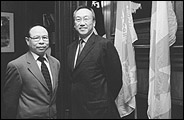A chair is born
Dr Togas Tulandi, associate director of the McGill Reproductive Centre, got a rather unusual birthday present last Monday. At an official reception announcing the new Dr Milton Leong Chair in Reproductive Medicine, Tulandi was introduced as its first holder.
 Dr Togas Tulandi and Dr Milton Leong
Dr Togas Tulandi and Dr Milton LeongPHOTO: Claudio Calligaris |
|
The chair, which has just been established, is the first of its kind in Canada according to Dean of Medicine Abraham Fuks. "Very few (chairs) will do what this chair does in linking research and patient care together."
A full professor of obstetrics and gynecology since 1991 and a renowned expert on reproductive endocrinology and infertility, Tulandi was the first physician in North America to use microwave endometrial ablation to control excessive menstrual bleeding. "Dr Tulandi is not just a good scientist and clinician," says Dr Seang Lin Tan, chair of the Department of Obstetrics and Gynecology. "He's also a good teacher."
The McGill Reproductive Centre was opened in 1996 to encourage collaboration between University and McGill University Health Centre specialists and researchers in the area of reproduction.
It has been involved in several impressive firsts and research breakthroughs, including the development of a technique for maturing eggs outside ovaries, North America's first in-vitro maturation egg donation pregnancy and Canada's first successful pre-implantation genetic diagnosis program. The centre deals with 20,000 patients a year.
The ties between Leong and Tulandi go back more than 20 years. Leong graduated from McGill's Faculty of Medicine in 1970 and returned as coordinator of student teaching for the Department of Obstetrics and Gynecology from 1975-1979.
One day at the Montreal General Hospital, he took Tulandi, then still a student, aside and said he'd teach him how to make good square knots -- a difficult but effective surgical procedure -- Tulandi recalls. "I'm still making good square knots, except that now I'm doing it with laparoscopy."
Leong returned to his native Hong Kong in 1979, where he set up his own practice and was responsible for Hong Kong's first in-vitro fertilized baby in 1986. He is now director of the IVF Centre at the Hong Kong Sanitorium and Hospital.
Despite the distance, Leong has remained committed to his alma mater. He and his wife, Susie, also a McGill graduate, created endowed fellowships in health sciences to encourage McGill students to study in China and for Chinese students to be able to come to McGill.
He has been president of the McGill Society of Hong Kong since 1996 and earned the Alumni Association's Distinguished Service Award two years ago. He was recently awarded an honorary degree at the University's fall convocation.
"I owe everything to McGill," Leong says. "I think my biggest gift to McGill isn't the Chair in Reproductive Medicine, but S.L. Tan," he adds, turning to Tan.
Then he recalled how he had advised Tan to accept a position at McGill rather than one at the University of British Columbia four years ago.
"I'm not a rich man, but once you get past daily needs, you have to give back in any way you can," Leong says. He lives the Chinese proverb: When you drink water, remember its source. Leong certainly does.

